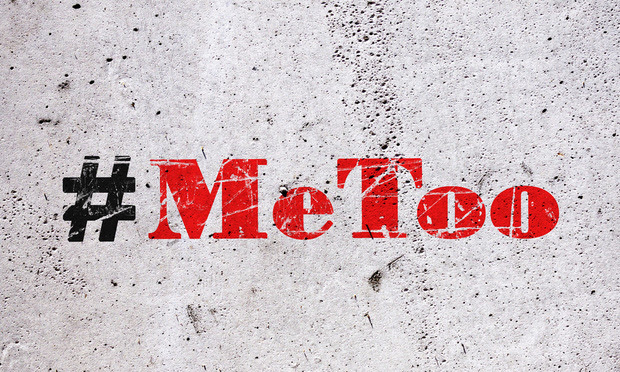Labor of Law: NDAs in Focus | #MeToo and the NLRB | Who Got the Work
Are your clients ready for potential restrictions on non-disclosure agreements? Plus, labor unions could be the next big force in the #MeToo movement.
April 26, 2018 at 12:00 PM
8 minute read
Welcome to Labor of Law. We're watching movement in #MeToo to confront nondisclosure agreements—in the courts, public opinion and statehouses. And there's a growing spotlight on the EEOC, where Trump hasn't landed a single confirmation.
I'm Erin Mulvaney in Washington, D.C., covering labor and employment from the Swamp to Silicon Valley. Follow this weekly newsletter for the latest on the L&E front. We love feedback—send any suggestions to [email protected]and find me on Twitter @erinmulvaney. Thanks always for reading.
#MeToo Targets Nondisclosure Agreements
Companies and outside lawyers—both on the management and plaintiffs side—are reckoning with potential changes to nondisclosure agreements. Here's a snapshot of how things are playing out in various spaces.
I caught up this week with Florida lawyer Sara Blackwell, the attorney in Sarasota who's leading the charge against workplace restrictions on cheerleaders in the NFL. Blackwell tells me that arbitration and nondisclosure agreements signed by the women kept their stories of alleged discrimination under the radar. Blackwell claims employment rules in the NFL place burdens on cheerleaders that are more rigid than those for players. The NYT's done a lot on this story, and here's a link to the latest piece.
“Everyone asks, 'Why are you the first to bring this kind of suit, if it's been going on. The fact is, I don't think I am. I am just the first one to come public,” Blackwell says. “These NDAs have kept it quiet.”
➤➤ Arbitration agreements are widespread in the United States. A new worker-friendly Economic Policy Institute study found that about half of private sector employees sign mandatory arbitration, and a third of those include class action waivers. The win rate in arbitration skews toward the employers, the study found, with employees winning only 21 percent.
➤➤ A federal lawsuit against Washington, DC celebrity chef Mike Isabella is expected to test the scope of a nondisclosure agreement. The lawyer who filed the suit—Debra Katz of Washington's Katz, Marshall & Banks—seeks a court order invalidating nondisclosure agreements at the restaurants. These agreements allegedly say employees would be on the hook for $500,000 plus legal fees if any confidentiality is breached.
➤➤ Meanwhile in statehouses, more than 100 bills or resolutions related to sexual harassment and workplace misconduct have been introduced during the 2018 state legislative session, according to the National Conference of State Legislatures. The themes common in these proposals include limitations on the use of confidentiality agreements.
Many states, including New York and Pennsylvania, have pushed such proposals. California's also been a leader in this area, introducing nearly two dozen bills addressing the issue, on top of legislation from 2017. One recent measure would prevent businesses from forcing workers into closed-door settlements.
Kimberly Chase, a partner in the Orange County office of Haynes and Booneand member of the labor and employment group, tells me the latest California measure would have a “significant impact.” Chase says the bill could complicate the process of settling sexual harassment claims.
Chase says the would-be new law could create a slippery slope for employers, “potentially opening the door for claims by unsuccessful applicants to argue that they were retaliated against for refusing to sign a proposed agreement.”
➤➤ The U.S. Supreme Court any week now will publish the Epic Systems ruling on whether employment agreements can include class action waivers. Dozens of companies have cases tied up over this issue. The court's way behind its historic pace for issuing decisions. We'll have a lot more to say on the ruling—and I'd love to hear your thoughts once the ruling is out.
Meanwhile, Microsoft announced in December it would change its arbitration practices. Big Law recently took some proactive measures. Munger, Tolles & Olson and Orrick, Herrington & Sutcliffe both said they would no longer require employees to sign mandatory arbitration.
Agency Updates: #MeToo and the NLRB
A recent National Labor Relations decision focused on a pay equity dispute between the Colorado Symphony Association and certain musicians. The board ordered the association to provide the American Federation of Musicians with requested contract information.
The board concluded that “investigating possible employer race or sex discrimination is a legitimate purpose related to a union's collective-bargaining duties and responsibilities,” even without the presence of a non-discrimination clause in the contract.
Seyfarth Shaw attorneys Kyllan Kershaw and Kaitlyn Whiteside this week spotlighted the decision, saying the board bolstered the ability of unions to use requests for information to investigate alleged discrimination and pay equity.
“Employers should note that this case can be seen as emblematic of the increased expectations of a union's responsibilities in the “Me Too” era,” Kershaw and Whiteside wrote on Seyfarth's employer labor relations blog. “It also appears that the NLRB is willing to accept these additional expectations as a legitimate responsibility of a union as the employee's collective bargaining representative.”
One big question ahead…
“What remains to be seen is how far a union will go to protect its female members from sex discrimination and how much information the NLRB will require an employer to provide on non-mandatory subjects of bargaining where a union claims its request relates to investigating possible discrimination.”
➤➤ Obama-appointed EEOC commissioner Chai Feldblum was the first openly LGBT member of the agency and has served as a progressive voice there ever since her confirmation. She's part of a 2-1 Democratic majority at the board—as Trump's two Republican nominees await confirmation in the U.S. Senate. Conservatives continue to express rancor over Trump's move to reappoint Feldblum to a new term.
The Atlantic takes a dive into the back story, concluding that Republican leaders in the Senate are not eager to make the EEOC a priority—instead “focusing on clearing higher-profile, higher-priority nominees.”
The other Trump nominees—Janet Dhillon, former Burlington Stores general counsel, and West Point professor Daniel Gade—have yet to be confirmed. This week a group of civil rights organizations objected to solo practitioner Sharon Gustafson's nomination as the EEOC's general counsel.
Who Got the Work
—> The California Supreme Court is set to consider “off-the-clock” laws. On May 1, the court will hear arguments that consider how to process wage and hour claims in a dispute between employees and Starbucks. The plaintiffs are represented by a team from Setareh Law Group, the Spivak Law Firm, and the Law Offices of Louis Benowitz. A team from Akin Gump Strauss Hauer & Feld represents Starbucks.
—> Primanti Bros. reach $2 million settlement in a wage and hour class action case. The more than 900 employees will receive a piece of the settlement. The plaintiffs' attorney included Gerald Wells of Connolly Wells & Gray and Gary Lynch of Carlson Lynch Sweet Kilpela & Carpenter. The defense team included Daniel Aiken and Matthew Fontana, both of Drinker Biddle & Reath.
—> A jury sides with University of Vermont in gender discrimination lawsuit. A former employee failed to prove to the jury that she was unfairly treated by the university. Attorney Karen McAndrew and co-counsel Kendall Hoechst handled the case on behalf of the university. The worker was represented by Siobhan McCloskey.
Around the Water Cooler
How Morgan Lewis grew into a powerhouse on its own terms. “Morgan Lewis has set itself apart when it comes to the type of work its growing roster of attorneys handles, at times sacrificing profitability for deeper relationships with clients.” [Law.com]
The Boston-based employment firm Lichten & Liss-Riordan, known for its advocacy for gig economy workers, is closing its San Francisco office two years after opening up shop in the city. [The Recorder]
Trump administration may change pay discrimination investigation practices. The Office of Federal Contract Compliance Programs will reportedly announce changes to the way it investigates pay disparities at companies. Contractors are cheering this potential shift and civil rights groups are saying it would favor businesses trying to hide pay discrimination of women and people of color. [Vox]
Management-side lawyers and antitrust specialists are parsing a recent U.S. Justice Department settlement targeting a “no poach” deal that restricted employee recruitment between two companies. [Corporate Counsel]
Uber releases another round of diversity numbers. The ride-hailing company's technical workforce—the engineers and specialists—is 18 percent women. The company says it has just gotten started with efforts to diversify. [CNN]
That's all for this week. Shoot me your story ideas, tips and feedback: [email protected]
This content has been archived. It is available through our partners, LexisNexis® and Bloomberg Law.
To view this content, please continue to their sites.
Not a Lexis Subscriber?
Subscribe Now
Not a Bloomberg Law Subscriber?
Subscribe Now
NOT FOR REPRINT
© 2025 ALM Global, LLC, All Rights Reserved. Request academic re-use from www.copyright.com. All other uses, submit a request to [email protected]. For more information visit Asset & Logo Licensing.
You Might Like
View All
Global Lawyer: Big Law Walks a Tightrope But Herbert Smith Freehills Refuses to Lose Its Footing
8 minute readTrending Stories
Who Got The Work
J. Brugh Lower of Gibbons has entered an appearance for industrial equipment supplier Devco Corporation in a pending trademark infringement lawsuit. The suit, accusing the defendant of selling knock-off Graco products, was filed Dec. 18 in New Jersey District Court by Rivkin Radler on behalf of Graco Inc. and Graco Minnesota. The case, assigned to U.S. District Judge Zahid N. Quraishi, is 3:24-cv-11294, Graco Inc. et al v. Devco Corporation.
Who Got The Work
Rebecca Maller-Stein and Kent A. Yalowitz of Arnold & Porter Kaye Scholer have entered their appearances for Hanaco Venture Capital and its executives, Lior Prosor and David Frankel, in a pending securities lawsuit. The action, filed on Dec. 24 in New York Southern District Court by Zell, Aron & Co. on behalf of Goldeneye Advisors, accuses the defendants of negligently and fraudulently managing the plaintiff's $1 million investment. The case, assigned to U.S. District Judge Vernon S. Broderick, is 1:24-cv-09918, Goldeneye Advisors, LLC v. Hanaco Venture Capital, Ltd. et al.
Who Got The Work
Attorneys from A&O Shearman has stepped in as defense counsel for Toronto-Dominion Bank and other defendants in a pending securities class action. The suit, filed Dec. 11 in New York Southern District Court by Bleichmar Fonti & Auld, accuses the defendants of concealing the bank's 'pervasive' deficiencies in regards to its compliance with the Bank Secrecy Act and the quality of its anti-money laundering controls. The case, assigned to U.S. District Judge Arun Subramanian, is 1:24-cv-09445, Gonzalez v. The Toronto-Dominion Bank et al.
Who Got The Work
Crown Castle International, a Pennsylvania company providing shared communications infrastructure, has turned to Luke D. Wolf of Gordon Rees Scully Mansukhani to fend off a pending breach-of-contract lawsuit. The court action, filed Nov. 25 in Michigan Eastern District Court by Hooper Hathaway PC on behalf of The Town Residences LLC, accuses Crown Castle of failing to transfer approximately $30,000 in utility payments from T-Mobile in breach of a roof-top lease and assignment agreement. The case, assigned to U.S. District Judge Susan K. Declercq, is 2:24-cv-13131, The Town Residences LLC v. T-Mobile US, Inc. et al.
Who Got The Work
Wilfred P. Coronato and Daniel M. Schwartz of McCarter & English have stepped in as defense counsel to Electrolux Home Products Inc. in a pending product liability lawsuit. The court action, filed Nov. 26 in New York Eastern District Court by Poulos Lopiccolo PC and Nagel Rice LLP on behalf of David Stern, alleges that the defendant's refrigerators’ drawers and shelving repeatedly break and fall apart within months after purchase. The case, assigned to U.S. District Judge Joan M. Azrack, is 2:24-cv-08204, Stern v. Electrolux Home Products, Inc.
Featured Firms
Law Offices of Gary Martin Hays & Associates, P.C.
(470) 294-1674
Law Offices of Mark E. Salomone
(857) 444-6468
Smith & Hassler
(713) 739-1250













